Studying in the UK is an exciting experience, but it comes with its share of challenges, one of which is understanding and accessing healthcare. For international students in the UK, it’s essential to understand the National Health Service (NHS) and the various aspects of healthcare in the UK, as it may be very different to your healthcare system at home.
In this guide, we’re going to explain how the NHS works, including how to register for a General Practitioner (GP) and dentist, access both physical and mental health support, seek emergency care at A&E, and get medications.

What is the NHS and how does it work?
The UK is very lucky to have a comprehensive healthcare system called the NHS (National Health Service). It was founded in 1948 and was established to provide healthcare services that were free at the point of use, funded through taxes paid by UK residents. It’s a beloved aspect of UK life!
This means that when you live in the UK, you can access doctor/GP services, as well as hospital, mental health, sexual health and family planning services for free.
Other services like dental, prescriptions, and optometry are usually at a much lower cost through the NHS than private too. The rules and exemptions may vary throughout the UK though, as healthcare is devolved across the four nations – England, Wales, Scotland and Northern Ireland.
UK healthcare and student visas
When applying for a student visa in the UK, most international students will need to pay the Immigration Health Surcharge (IHS). This is paid before arriving in the UK, and the price varies depending on your visa duration and if it covers any extra dependents.
You may be exempt from paying the IHS if your visa is less than six months, if you’re studying a particular healthcare profession, or if you are an EU, EEA or Swiss national.
Once you’re in the UK, you’ll have access to healthcare on the same basis as a UK resident. Completing your visa correctly and paying the IHS will allow you to smoothly settle into life in the UK, ensuring you are covered in case you need medical support.

Private Health Insurance
While the NHS provides comprehensive healthcare services, some international students may choose to supplement this with private health insurance. Private health insurance can offer additional benefits, including faster access to specialist services and elective treatments that may not be readily available through the NHS.
Registering for a GP and dentist in the UK
You would visit your local GP for any non-emergency healthcare services, and there are plenty of local GP services across the UK that you can register for. Here’s how to register:
1. Locate a nearby GP surgery using the NHS website
2. Contact them either via email, phone or in person to enquire about registration
3. Bring ID, proof of address, and your student visa when registering in person.
Once registered you can book appointments via phone call for general health concerns, vaccinations, and even mental health support.
dentists
Dental care can also be provided through the NHS, and it’s crucial to register for regular check-ups. It’s best to do this as soon as you arrive in the UK, as the waiting lists for NHS dentists in the UK can be quite long, especially in busy cities.
1. Find a local NHS dentist using the NHS website
2. Go through the same process as you would registering for a GP
3. Dental services may have charges, so be aware of the costs associated with different treatments

HOSPITAL AND EMERGENCY SERVICES
The UK is very fortunate that both hospital and emergency services are covered by the NHS – so if you ever need an ambulance or treatment for a serious condition or accident, you don’t need to worry about a huge medical bill afterwards. In case of emergencies or urgent medical situations, A&E departments in UK hospitals are equipped to provide immediate care. All you need to do is call 999. It’s important to understand when to call an ambulance or visit A&E:
Emergency cases: Such as severe injuries, chest pain, difficulty breathing or suspected strokes
Urgent medical attention: When your GP is unavailable and you need urgent care.
Remember, only call 999 or visit A&E if it really is an emergency. For non-emergencies, the best thing to do is to contact your GP, or you can call 111 for medical advice, and they can tell you if you should visit A&E.

ACCESSING MEDICATION
In the UK, many medications can be purchased over the counter, without a prescription. You can get these in local pharmacies, as well as most supermarkets.
Over-the-counter medications include pain relief like Paracetamol, Ibuprofen and Aspirin, cold and flu remedies, antihistamines, topical creams, eye drops, and contraceptives like condoms or emergency contraceptives. You would need to visit a doctor to get other contraceptives like birth control pills or an IUD.
If you’re unsure about the type of medication you should take, you should make sure to consult the pharmacist in-store.
prescriptions
If a healthcare professional prescribes a medication during a GP appointment or hospital visit, they will give you a prescription that you would take into your local pharmacy.
Medications prescribed by the NHS may have associated costs, but some groups, including students, may be exempt. Check with your doctor when they give you the prescription.

accessing mental health support
Accessing mental health support services in the UK is a crucial aspect of wellbeing for students – and it’s important to know that you can access support, for free, through the NHS. Here’s how you can navigate the process.
1. Register with a GP
2. book an appointment with your GP OR SELF-REFER
Schedule an appointment with your GP to discuss your mental health concerns – speak openly with them as they are there to help. They are trained to address a range of mental health concerns and can provide an initial assessment to then refer you to a particular mental health service. You can refer yourself for talking therapies instead of going through a GP.
3. REFERRAL TO MENTAL HEALTH SERVICES
Based on your assessment, your GP may offer support, provide medication if necessary, or refer you to a specialist mental health service. This may include a community mental health team, a psychiatrist, a counsellor or a local mental health service.

4. TALKING THERAPIES
The NHS offers talking therapies like Cognitive Behavioural Therapy (CBT), counselling or psychotherapy for anyone experiencing mild to severe mental health issues.
5. ACCESSING CRISIS SUPPORT
In urgent situations, you can contact NHS crisis services to get the help you need. This includes calling NHS 111 or going to your nearest A&R for help.
The UK also has a number of mental health crisis helplines that provide immediate support, including Samaritans (116 123) and Shout (text “SHOUT” TO 85258).
6. UNIVERSITY SUPPORT SERVICES
Your university will also have its own mental health support services, offering counselling and well-being programs – so if you find yourself struggling, you can enquire on campus to get quick support.
You can explore all of the NHS mental health support options here.
other university health services
Many UK universities also have their own on-campus health centres, and is referred to as “student health services”.
This includes GP services, where you can get general medical consultations, vaccinations, prescriptions, sexual health services and more.
All you need to do is register like you would a normal GP surgery – you may be required to complete a health questionnaire before booking an appointment.
Navigating the UK healthcare system may seem overwhelming at first, but understanding the basics is crucial for a smooth and healthy stay. Registering with a GP and dentist, knowing when to visit A&E, and managing prescriptions are key aspects of ensuring you receive the care you need. By being proactive and informed, you can make the most of the UK’s incredible NHS system and access healthcare when you need it.



